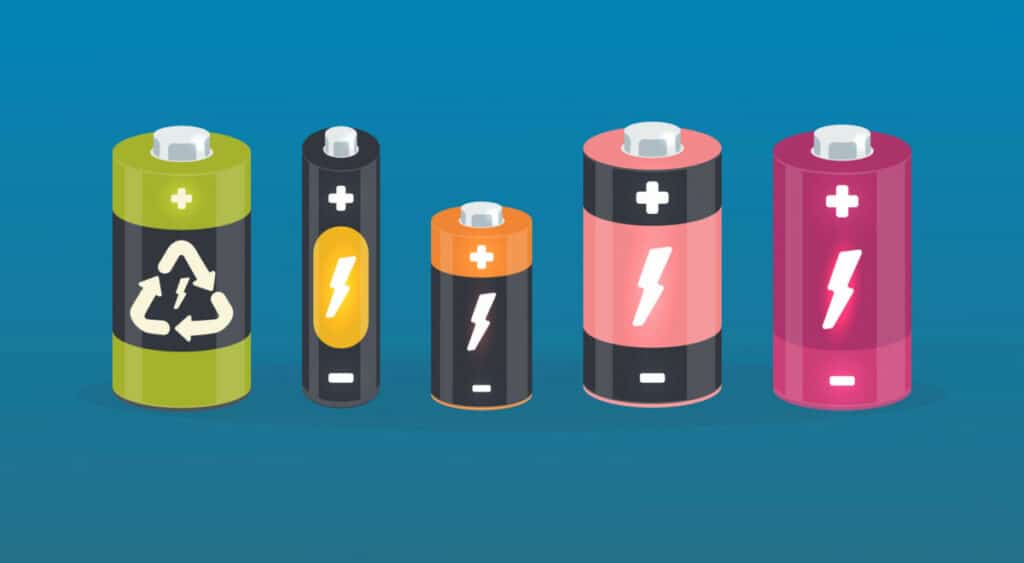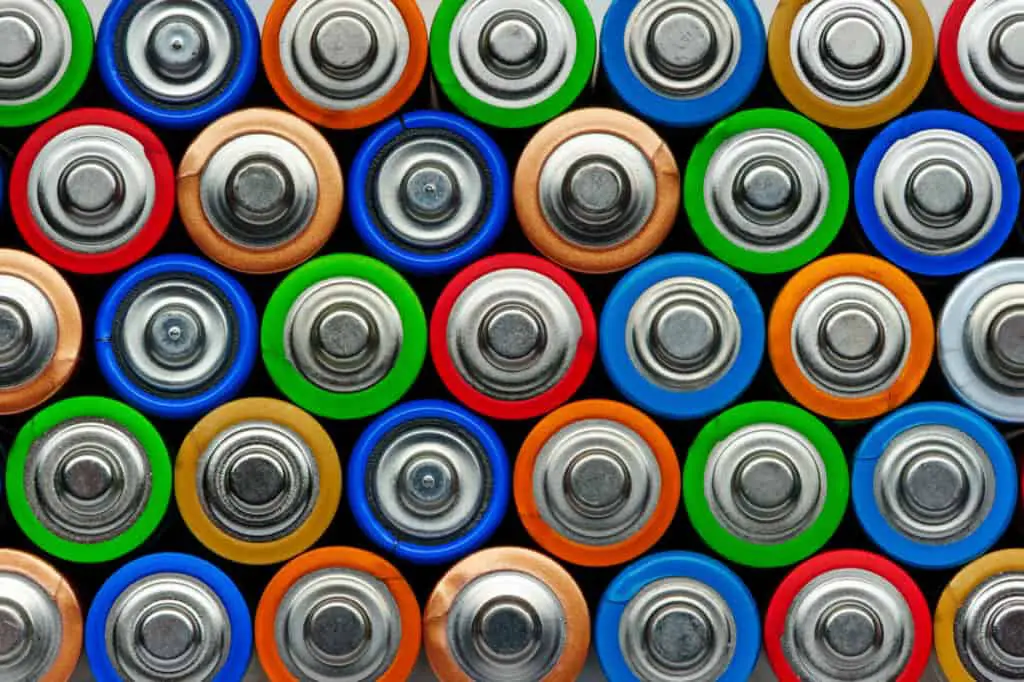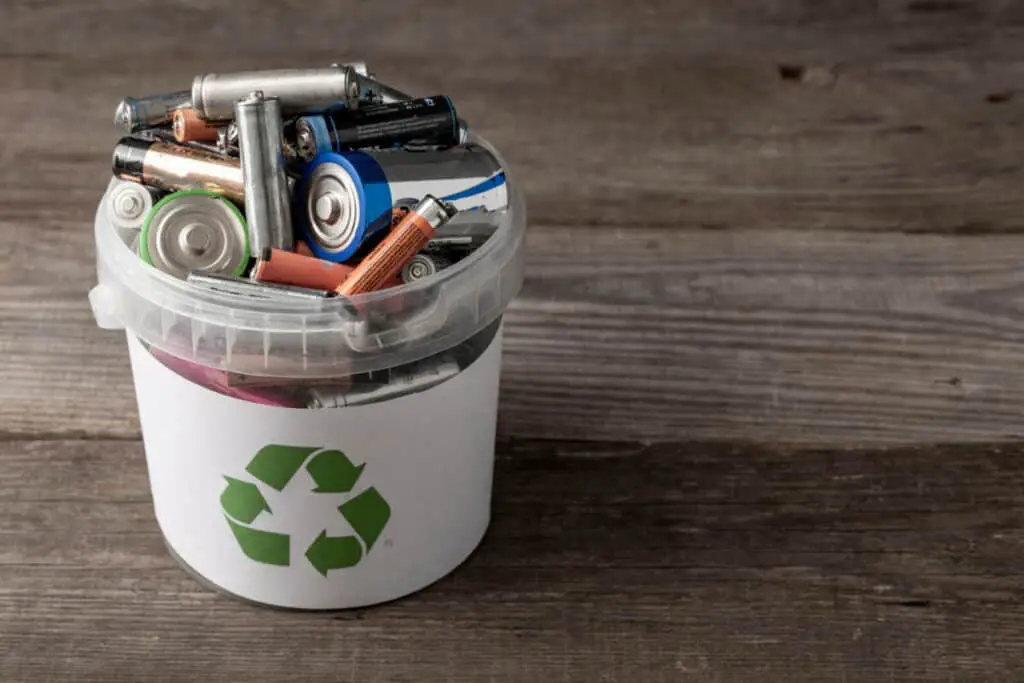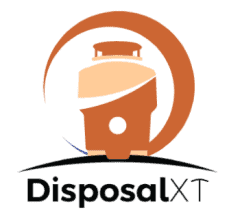
Recycling batteries can be a confusing process that not many people talk about. When recycling a battery, recycling centers may not be available in every location, but there are options sponsored by city departments, waste disposal districts/companies, or health departments. But what exactly should you do with each kind of battery?
Alkaline batteries can be disposed of regularly, but recycling them is recommended. Lithium batteries, button batteries, and a few other ‘universal waste’ batteries need to be recycled and disposed of properly. Take batteries to household hazardous waste collection events or drop-off locations.
Let’s go over the different types of batteries and what you should do with each one.
Alkaline and Zinc-Carbon Batteries
In most communities, Alkaline and Zinc-Carbon batteries can be safely placed in your household trash. However, the EPA recommends checking with your state and solid waste authorities if your local battery recyclers do not take Alkaline or Zinc-Carbon batteries. (source)
Non-Removable Batteries
The EPA recommends that the entire device be brought to either a certified electronic recycler, participating retailers that provide electronic take-back services, or local electronics or household hazardous waste collection programs. (source)
Rechargeable Batteries
Lithium-Ion (L-Ion) Battery
These batteries are commonly found in small and large appliances. If disposed of incorrectly and/or broken, bent, or crushed they can become a fire hazard.
Nickel Cadmium (Ni-Cd) Batteries
Nickel Cadmium batteries look similar to single-use AA, AAA, or other Alkaline batteries or a battery pack shaped for specific tools. These batteries once spent can be brought to specialized battery recyclers, participating retailers that provide battery take-back services, or local household hazardous waste collection programs.
You may also be able to contact your manufacturer or local household hazardous waste authority for other management options.
Small Sealed Lead Acid (SLA) Battery
Commonly found in mobility scooters, children’s toy cars, emergency lighting, and hospital equipment, these batteries can be brought to specialized battery recyclers, participating retailers that provide battery take-back services, or local household hazardous waste collection programs.
Depending on the product, your options for recycling or having the company provide a battery or product take-back service could be available at no cost to you. (source)

Automotive Batteries
When your car battery dies, it can be incredibly frustrating and confusing to know where to put the old battery. When my car battery died a cold sputtering death in the depths of winter, I was surprised to learn that Walmart Auto Center does run a program where you can return your old battery, as you cannot just place an automotive battery in the landfill.
If you purchase a Walmart automotive battery from their auto shop and keep the receipt for when you turn in the battery, you get at least $10 back for turning in the old battery! However, they will still take your battery if you simply need to dispose of it – you just won’t get something back in return.
Here are several different types of the most common automotive batteries and what is recommended for their disposal.
Lead-Acid Battery
Lead-acid batteries contain both lead and lead-contaminated sulfuric acid. They can be used as an engine starting or the automotive power battery that moves the entire vehicle. Some examples in where lead-acid batteries can be found are automobiles, boats, all-terrain vehicles, wheelchairs, and other large transportation vehicles that require a battery.
They may also be used in non-automotive situations as backup generators for basement sump pumps or as constant uninterrupted power supplies for computers or other important equipment.
The EPA recommends returning lead-acid batteries to a battery retailer or your local household hazardous waste collection program.
When handling these batteries, handle them with caution as these batteries contain sulfuric acid and lead. When handling the battery for proper disposal, follow all warnings and instructions on the battery label or product instructions manual.
Medium and Large Scale Li-ion
Plug-in and hybrid electric vehicles use Li-ion batteries to either store power for the hybrid systems or power the electric motor that moves the vehicle.
Li-ion batteries also can be found in energy storage (both on and off-grid) and can be found both in automotive situations and in energy storage that can be found installed in buildings.
Due to the complexity and scale of these battery systems, medium and large Li-ion batteries cannot be removed by the consumers of these products. Refer to the manufacturer’s instructions and heed any warnings and safety instructions.
When considering where to dispose of Medium or large Li-ion batteries found in automobiles, the EPA strongly recommended that the consumer contact the automobile dealer, shop, or salvage yard where the battery was purchased for further instructions on programs or instructions on where to dispose of the battery.
The EPA strongly recommends contacting the energy storage equipment manufacturer or company or the company that installed the battery for further instructions on programs or instructions on where to dispose of the battery.
Do not dispose of Li-ion batteries in the trash or municipal recycling bins, as these places are unequipped to dispose of the batteries safely. (source)

Varying State Laws on Disposal
Not every state has a mandated standard for disposing of batteries. Checking your state legislature on the requirements for disposal is a great way to make sure that you are complying with the local standards set up by your local government.
For example, California has strict recycling requirements where any household battery – single-use or rechargeable – is to be recycled through a household hazardous waste handler or another authorized facility. Washington State has no recycling requirements, and New York requires the producers to fund or offer battery recycling.
Call2Recycle has an interactive map where you can see what your state has in requirements for recycling batteries.
Partnered Companies
Many hardware companies have teamed up with battery recycling organizations and companies to help the public dispose of their batteries responsibly and in the proper manner. Home Depot has partnered with Call2Recycle, a nonprofit recycling program to be recycled. (source)
Check with your local hardware stores to see if they offer programs to recycle batteries.
For automotive batteries, check with your local automotive dealership or auto shop to see if they run a program for exchanging old automotive batteries.
Related Topics:
If you like the article above, here are some other similar articles you should check out!
